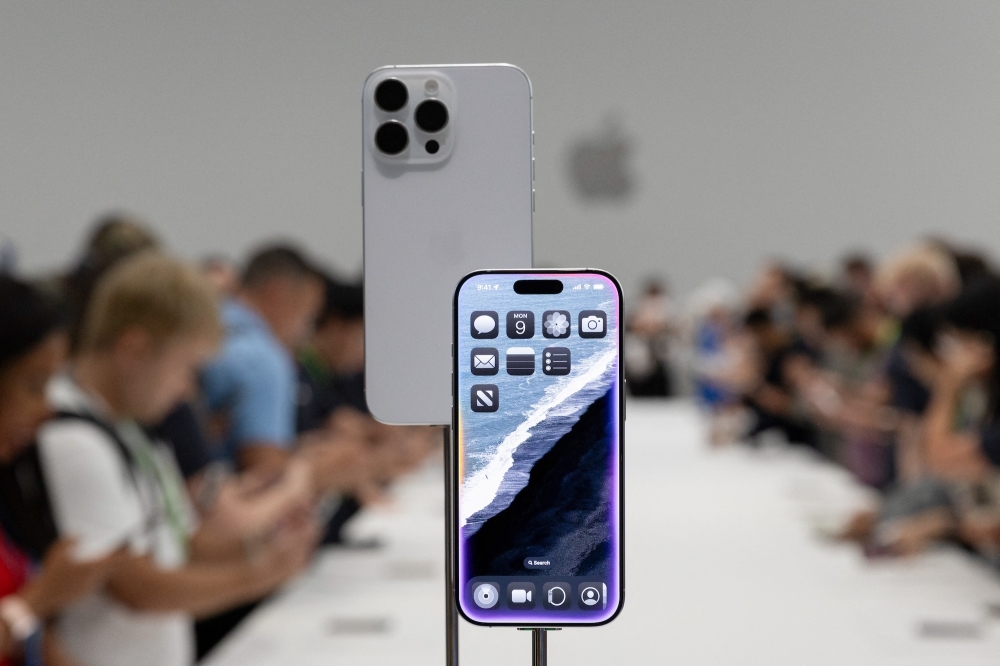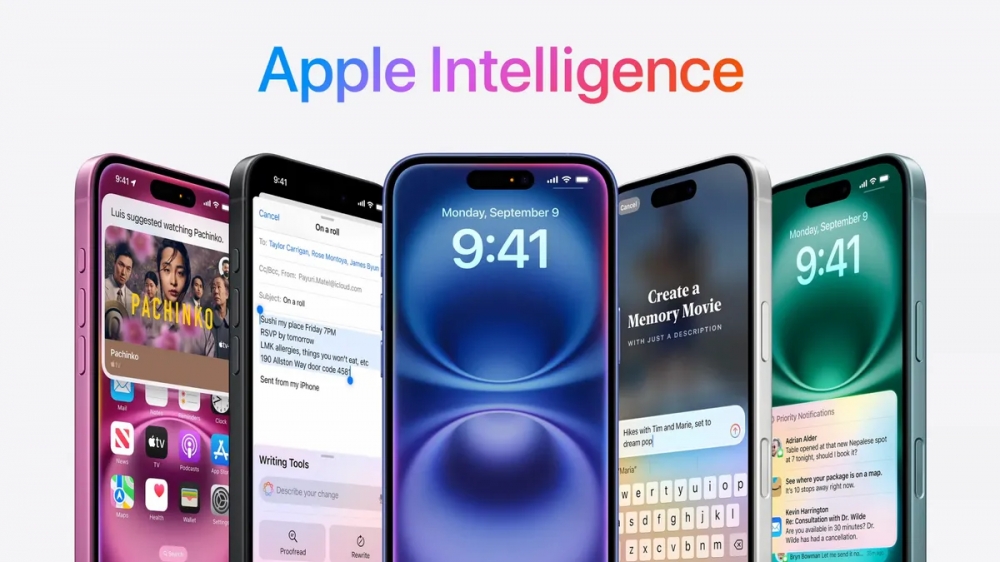Apple Embraces Artificial Intelligence with Bold New iPhone 16 Lineup
- Siri just got a serious upgrade—you literally won't recognize her.
- Apple’s betting big on AI... but some key features are MIA until iOS 18.
- Is the iPhone 16 an AI powerhouse, or just another step behind Samsung and Google? Read on.
Apple’s latest venture into the realm of artificial intelligence was front and center Monday as it unveiled the highly anticipated iPhone 16 lineup. At the core of the launch: AI-powered innovation designed to elevate the device from a mere smartphone to a personal assistant capable of handling the future's most complex tasks.
The iPhone 16, available in four models ranging from $800 to $1,200, is not just another incremental update—Apple is betting big on AI to reverse slumping sales and capture the imagination of a tech-hungry world.
“Apple Intelligence”: A Bold Move in AI
 Photo via Reuters // Apple CEO Tim Cook unveils the new AI-powered iPhone 16 lineup during Monday's event.
Photo via Reuters // Apple CEO Tim Cook unveils the new AI-powered iPhone 16 lineup during Monday's event.
In a world already captivated by AI developments from rivals like Samsung and Google, Apple’s take on the technology, branded as "Apple Intelligence," promises more privacy-focused, on-device processing. This sets the iPhone 16 apart by claiming to handle tasks without relying heavily on massive, off-site data centers—a direct nod to privacy-conscious consumers.
But it’s worth noting that, for all its fanfare, the underlying AI technology mimics much of what’s already available on competitors' devices. Paolo Pescatore, a tech analyst at PP Foresight, said it best:
Apple could have waited another year for further development, but initial uptake of AI-powered devices from Samsung and Google has been encouraging. Apple is keen to capitalize on this market.— Paolo Pescatore, PP Foresight
Apple CEO Tim Cook, in his signature understated style, vowed that the company's AI capabilities would, in his words, “make a true difference in people's lives.” Whether it’s transforming the notoriously lackluster Siri into a powerhouse or automating tedious daily tasks, Apple is staking its claim in AI with high hopes.
Key Features of iPhone 16’s AI:
 Photo via Apple Inc. // Apple’s redesigned Siri promises to be smarter, faster, and more intuitive with AI enhancements.
Photo via Apple Inc. // Apple’s redesigned Siri promises to be smarter, faster, and more intuitive with AI enhancements.
- Smarter Siri – The once-mocked virtual assistant is now smarter, more intuitive, and proactive.
- On-Device Processing – Most AI features run locally on the iPhone, offering enhanced privacy.
- Custom Emojis – Create personalized emojis in seconds, a fun touch that may win over casual users.
- AI-Powered Automation – Tedious tasks, from scheduling to reminders, are handled effortlessly by AI.
But here’s the catch: the full potential of Apple Intelligence won’t be felt until iOS 18 rolls out in late October. Most of the AI functionality won’t be fully operational at launch, with support for languages beyond English delayed until 2025.
A Late Arrival?
Although Apple’s unveiling was celebrated with the usual fanfare, the tech giant’s entry into the AI race comes at a time when others have already made significant strides. Samsung’s Galaxy S24 and Google’s Pixel 9, both released earlier in the year, have arguably set the bar for what consumers expect from AI-driven smartphones.
Yet, Apple, true to form, believes it can redefine the space. The company is making sure that its AI approach adheres to its longstanding ethos of privacy and security. However, no system is entirely foolproof—despite Apple's assurances, a lost or hacked device can still expose users to risks.
Privacy Concerns in the Age of AI
Apple promises that its AI tools will keep most personal data within the confines of the iPhone itself. For more advanced tasks, the company is partnering with OpenAI to incorporate ChatGPT for those wanting extra power. But this privacy-first approach could be a double-edged sword. While it appeals to those wary of big tech data collection, it also risks limiting the iPhone’s ability to harness the full potential of cloud-based AI tools.
They’re walking a fine line, Apple’s AI privacy stance is admirable, but consumers expect groundbreaking features to just work—and sometimes that means relying on the cloud.— Emily Richmond
 Photo via Apple Inc. // Craig Federighi introduces Apple Intelligence at WWDC24 earlier in 2024. Apple's newly announced iPhone 16 lineup, featuring AI-powered automation, starts at $800 and goes up to $1,200 for the Pro models.
Photo via Apple Inc. // Craig Federighi introduces Apple Intelligence at WWDC24 earlier in 2024. Apple's newly announced iPhone 16 lineup, featuring AI-powered automation, starts at $800 and goes up to $1,200 for the Pro models.
Investors Watch Closely
One area where Apple can count on success is Wall Street. Investors have already rewarded the company with a 10% stock price increase, driven by expectations that the AI push will spark strong holiday sales. The fact that older models like the iPhone 15 won’t fully support the AI features creates an additional incentive for consumers to upgrade to the iPhone 16.
Beyond iPhones: A New Watch and AirPods
Not content to let the iPhone steal all the limelight, Apple also revealed updates to its Apple Watch and AirPods Pro. The latest smartwatch includes a feature to detect sleep apnea—a game changer for those with the condition—and the new AirPods Pro will soon function as hearing aids thanks to a forthcoming software update.
It’s an audacious vision of the future, one where Apple devices don’t just entertain, but genuinely assist in the health and well-being of their users.
The Bottom Line
With its delayed but ambitious foray into AI, Apple is clearly hoping to once again reshape how we interact with technology. Whether it’s enough to recapture the magic of earlier iPhone launches remains to be seen. But in a tech landscape increasingly dominated by artificial intelligence, Apple’s decision to brand its efforts as “Apple Intelligence” sends a clear message: Cupertino isn’t just playing catch-up—it’s aiming to lead the charge.
Recommended by the editors:
Thank you for visiting Apple Scoop! As a dedicated independent news organization, we strive to deliver the latest updates and in-depth journalism on everything Apple. Have insights or thoughts to share? Drop a comment below—our team actively engages with and responds to our community. Return to the home page.Published to Apple Scoop on 9th September, 2024.
No password required
A confirmation request will be delivered to the email address you provide. Once confirmed, your comment will be published. It's as simple as two clicks.
Your email address will not be published publicly. Additionally, we will not send you marketing emails unless you opt-in.